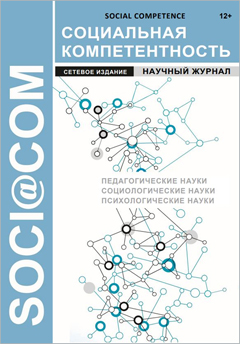The stages of interaction between the classroom teacher and parents in the prevention of adolescent mobile addiction
DOI:
https://doi.org/10.24866/2658-5855/2024-1/14-19Keywords:
mobile addiction, prevention, adolescents, stages of interaction, parents, family, homeroom teacherAbstract
The presented article analyzes the sources, which allowed the author to come to the conclusion that it is relevant to consider the possibilities of the family in the upbringing of the younger generation for modern pedagogical science. The research focus covers the definition of the role and functions of the family as a small social group, as a microsocium performing certain functions for the upbringing of a harmoniously developed personality; the description of family education models; the study of the role of the family in the formation of various forms of dependent behavior (mobile, Internet, computer) and the possibilities of the family in their prevention. The author has revealed the field of application of the available developments of theorists and practitioners of pedagogy in the organization of family inclusion in the prevention of mobile addiction based on increasing the competence of parents in matters of its prevention in the context of their interaction with the classroom teacher at motivational, cognitive and activity levels, implemented in certain stages (passive, active, interactive).
Downloads
References
Галагузова Ю.Н., Лабарешных Н.Н. Профилактика мобильной зависимости подростков в деятельности классного руководителя // Педагогическое образование в России, 2021. № 6. С. 171–177. = Galaguzova Yu.N., Labareshnykh N.N. Prevention of adolescent mobile addiction in the classroom teacher's activities. Pedagogical education in Russia, 2021, no. 6, pp. 171–177. (In Russ.).
Мудрик А.В. Введение в социальную педагогику. Москва: Московский психолого-социальный институт, 2008. 568 с. = Mudrik A.V. Introduction to social pedagogy. Moscow, Moscow Psychological and Social Institute Publ., 2008. 568 p. (In Russ.).
Капралова Р.М. Влияние семейных отношений на волевое развитие подростка: автореф. дис. … канд. пед. наук. Москва, 1967. = Kapralova R.M. The influence of family relations on the volitional development of a teenager: abstract of PhD (Pedagogy) Thesis. Moscow, 1967. (In Russ.).
Бабушкина А.В., Шишкина К.И. Роль семьи в формировании профилактики аддиктивного поведения младшего школьника // Вестник Набережночелнинского государственного педагогического университета. 2022. № S6(41). С. 14–15. = Babushkina A.V., Shishkina K.I. The role of the family in the formation of the prevention of addictive behavior of a younger student. Bulletin of Naberezhnye Chelny State Pedagogical University, 2022, no. S6(41), pp. 14–15. (In Russ.).
Устинов Н.В. Роль семьи в профилактике аддиктивных расстройств у молодежи // Глобальные вызовы современности и духовный выбор человека: материалы мультидисциплинарных конференций, проводившихся в рамках программы XXXI Международных Рождественских образовательных чтений. Москва, 2023. С. 57–63. = Ustinov N.V. The role of the family in the prevention of addictive disorders among young people. Global challenges of modernity and the spiritual choice of a person. Materials of multidisciplinary conferences held within the framework of the XXXI International Christmas Educational Readings program. Moscow, 2023, pp. 57–63. (In Russ.).
Русинова М.М. Роль семьи в профилактике компьютерной зависимости учащихся // Национальная ассоциация ученых. 2015. № 5–3(10). С. 72–75. = Rusinova M.M. The role of the family in the prevention of computer addiction of students. National Association of Scientists, 2015, no. 5–3(10), pp. 72–75. (In Russ.).
Макушкина О.А., Панченко Е.А., Кулыгина М.А. Роль семьи в формировании и профилактике общественно опасного поведения лиц с психическими расстройствами // Психиатрия, психотерапия и клиническая психология. 2018. Т. 9, № 2. С. 160–169. = Makushkina O.A., Panchenko E.A., Kulygina M.A. The role of the family in the formation and prevention of socially dangerous behavior of persons with mental disorders. Psychiatry, psychotherapy and clinical psychology, 2018, vol. 9, no. 2, pp. 160–169. (In Russ.).
Жаасынбек кызы А., Маманова А.Ж., Бабаева Х.С. Роль семьи в профилактике преступлений и правонарушений среди несовершеннолетних // Вестник Ошского государственного университета. Право. 2023. № 2(3). С. 28–33. = Zhaasynbek kyzy A., Mamanova A.Zh., Babaeva H.S. The role of the family in the prevention of crimes and offenses among minors. Bulletin of the Osh State University. Right, 2023, no. 2 (3), pp. 28–33. (In Russ.).
Философский энциклопедический словарь / гл. ред. Л.Ф. Ильичев. Москва: Советская энциклопедия, 1983. 839 c. = Philosophical encyclopedic dictionary. Ed. L. F.Ilyichev. Moscow, Sovetskaja Encyclopedia Publ., 1983. 839 p. (In Russ.).
Ефремова Т.Ф. Новый словарь русского языка. Толково-словообразовательный. В 2 т. Москва: Русский язык, 2000. = Efremova T.F. A new dictionary of the Russian language. Explanatory and word-formation: Over 136,000 dictionaries articles. [In 2 volumes]. Moscow, Rus. yaz. Publ., 2000. (In Russ.).
Лабарешных Н.Н., Галагузова Ю.Н. Взаимодействие классного руководителя и родителей в профилактике мобильной зависимости подростков // Актуальные проблемы социогуманитарного образования / под ред. Е.В. Донгаузер, Т.С. Дороховой. Екатеринбург, 2022. С. 150–153. = Labareshnykh N.N., Galaguzova Yu.N. Interaction of the class teacher and parents in the prevention of mobile dependence of adolescents. In: Actual problems of socio-humanitarian education. Ed. by E.V. Dongauzer, T.S. Dorokhova. Yekaterinburg, 2022, pp. 150–153. (In Russ.).
Downloads
Published
Issue
Section
License
Copyright (c) 2024 Наталья Николаевна Лабарешных

This work is licensed under a Creative Commons Attribution-NonCommercial-NoDerivatives 4.0 International License.


